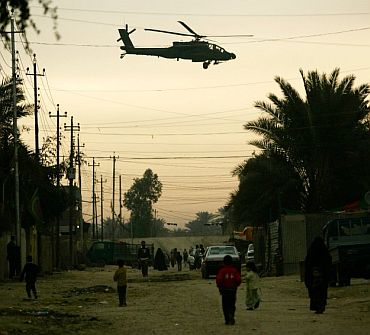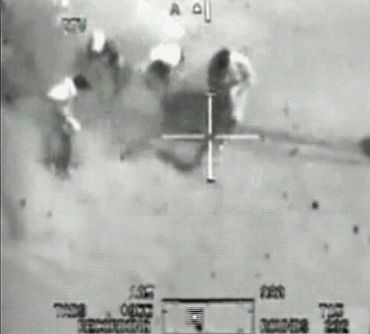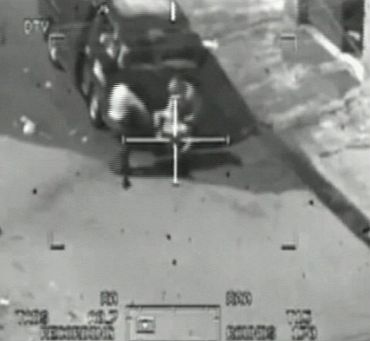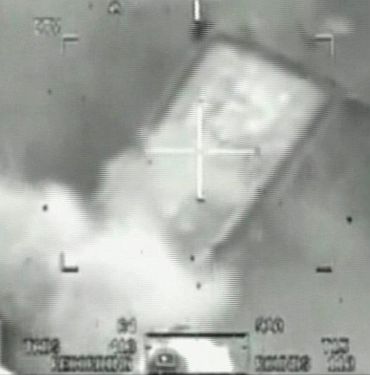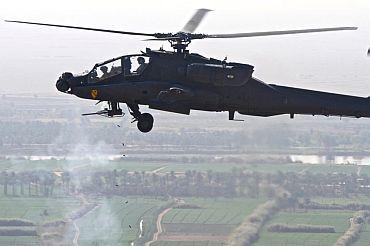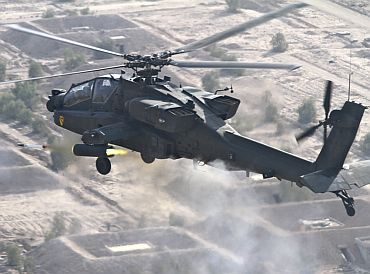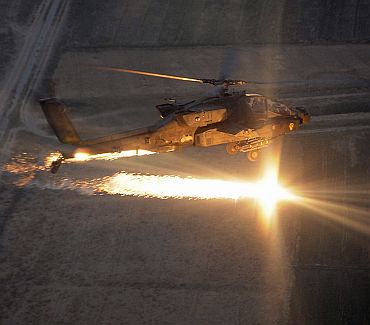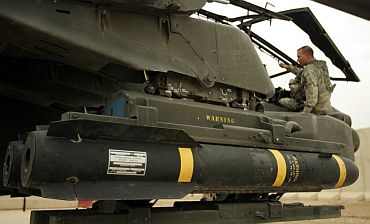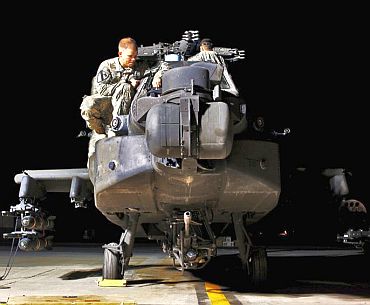 | « Back to article | Print this article |
US Apache chopper pilots guilty of war crimes?
Whistle-blowing website WikiLeaks has released nearly 400,000 secret American documents on Iraq war, calling it the 'largest classified military leak in history', despite Pentagon's warning that it could endanger informants and reveal war strategy.
The latest leaked documents chronicling the Iraq war from 2004 through 2009 provide a new picture of how many Iraqi civilians were killed, open a new window on the role that Iran played in supporting Iraqi militants and give many accounts of abuse by Iraqi army and police.
More importantly, the latest leak reveals a number of dubious attacks by Apache helicopters and raise the question of whether US pilots committed war crimes.
This photo shows an Apache helicopter flying over the Rasheed neighbourhood of Baghdad on February 22, 2007. On the same day, a serious incident involving an Apache took place in Baghdad, according to the Iraq war logs. The crew shot and killed two Iraqis who were clearly trying to surrender.
Click on NEXT to read further...
US Apache chopper pilots guilty of war crimes?
Also among the leaks included the video that WikiLeaks had posted in April 2010 in which a US helicopter crew is shown shooting and killing a Reuters photographer and his driver in a July 12, 2007 attack in Baghdad. In all, 12-15 people were killed, reports said.
This image is taken from the world-famous 'Collateral Murder' video. The footage shows how the crew of an Apache helicopter opened fire on innocent civilians.
US Apache chopper pilots guilty of war crimes?
In the recording, the helicopter crew can be heard discussing the scene on the street below, where one American claims to have spotted six people with AK-47s and one with a rocket-propelled grenade.
One of the helicopter crew is then heard saying that one of the group is shooting, but the video shows there is no shooting or even a pointing of weapons.
The supposed 'anti-Iraqi forces' who were killed were probably Iraqis who were simply in the wrong place at the wrong time. The video also shows how the crews asked for permission to open fire on a minibus rushing to the scene -- and how they obtained it.
US Apache chopper pilots guilty of war crimes?
The roughly 18-minute video is difficult to watch, partly because it isn't clear.
The pilots believe them to be insurgents, and mistake Noor-Eldeen's camera for a weapon.
"Look at those dead bastards," The New York Times quoted one pilot, as saying.
US Apache chopper pilots guilty of war crimes?
A wounded man can be seen crawling on the street. Couple of minutes later, the pilots open fire at a van, which had came to pick up the injured, wounding two children inside.
"Well, it's their fault for bringing their kids into a battle," one pilot said.
This is believed to be the last picture taken on Namir Noor-Eldeen's cameras while he was still alive. US soldiers retrieved his two digital cameras from the scene of the attack and later returned them to Reuters.
US Apache chopper pilots guilty of war crimes?
The report says that on that day, attack helicopters chased a dump truck on the ground. The US helicopter pilots apparently identified a truck equipped with heavy weapons, from which mortar shells were being fired. They destroyed the vehicle.
Two Iraqis fled headlong from the scene in a dump truck, heading north. Crazyhorse 18 went on their trail, and opened fire on them. Then something unexpected happened.
US Apache chopper pilots guilty of war crimes?
Apparently, the American helicopter crew was at a loss for a moment and was unsure how to deal with the situation. They called via radio for support from a military lawyer. The report continues: "Lawyer states they can not surrender to aircraft and are still valid targets."
The attack helicopter was cleared again to "engage" the vehicle.
US Apache chopper pilots guilty of war crimes?
Crazyhorse 18 fired a Hellfire missile at the two men, but missed the target. The two Iraqis then took refuge in a shack.
The helicopter crew did not give up. They opened fire on the shack. This time they hit their target. "Crazyhorse 18 reports engaged and destroyed shack with 2 x AIF (anti-Iraqi forces)," reads the report.
An additional protocol to the Geneva Conventions on the protection of victims of international armed conflicts states that a person who "clearly expresses an intention to surrender shall not be made the object of attack." That raises the question of whether the pilots involved in the Feb. 22, 2007 incident might have committed a war crime.
US Apache chopper pilots guilty of war crimes?
They are also equipped with 30 mm cannons and Hellfire missiles. Ground troops who get caught up in firefights often call in the helicopters for support.
According to Der Spiegel, whenever the Apaches appeared in the sky over Baghdad, it wasn't uncommon for hell to break loose on the ground.
US Apache chopper pilots guilty of war crimes?
The German daily noted that there is a huge gulf between the brief text of the military report that has now been published by WikiLeaks and the footage captured by the helicopter's camera.
The discrepancy makes clear that the military incident reports do not manage to capture the brutal reality of the war. In fact, the opposite is true -- the reports actually distort the reality.
Comparing the video evidence and the terse, unspectacular-seeming original report raises the question as to what might have happened during incidents where the internal military reports make for more dramatic reading. And there are plenty of those, Spiegel says.
